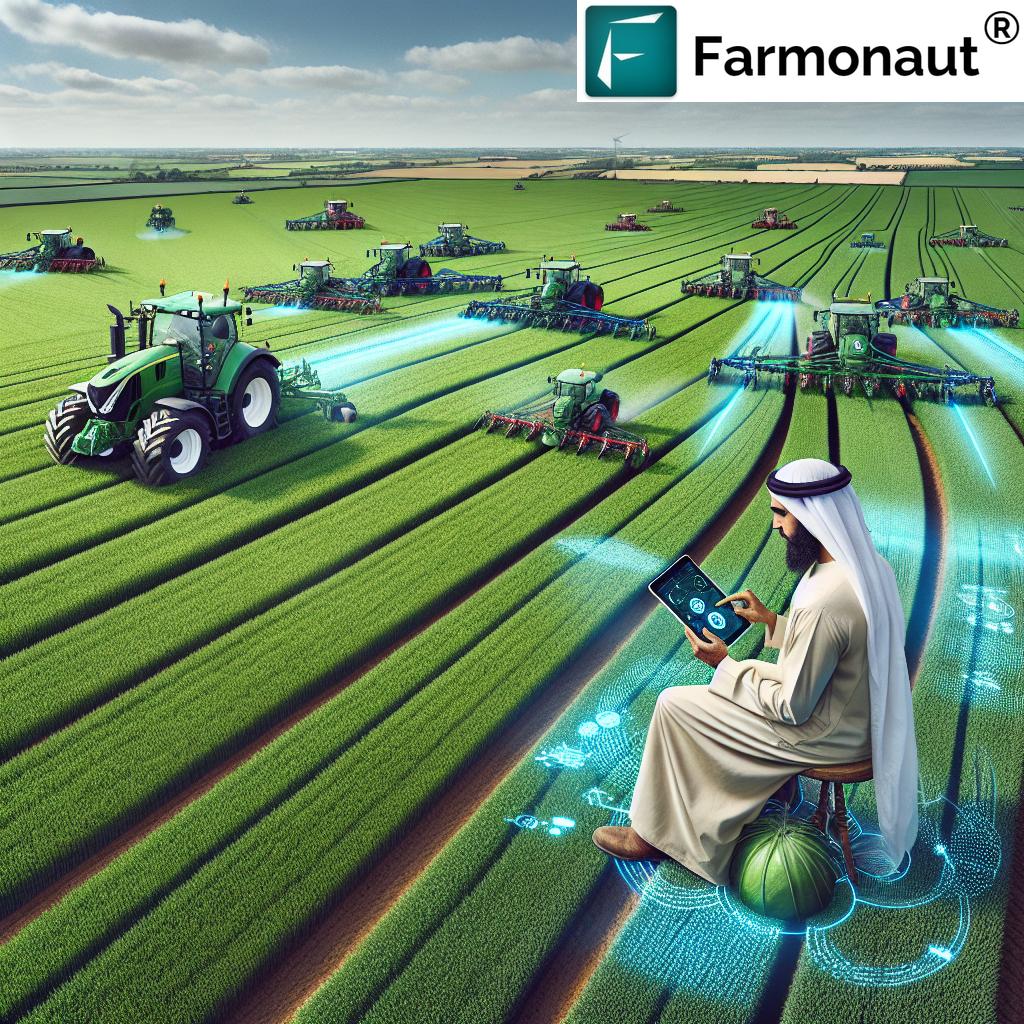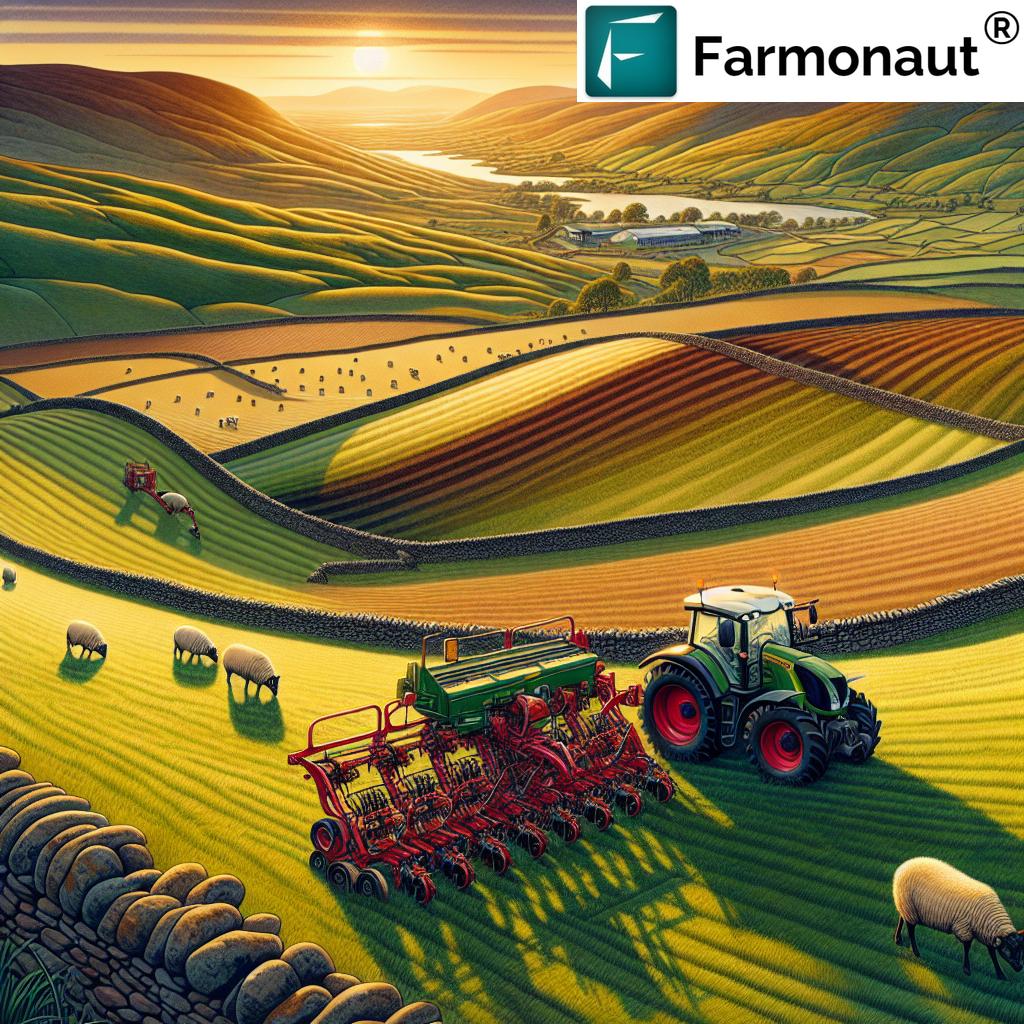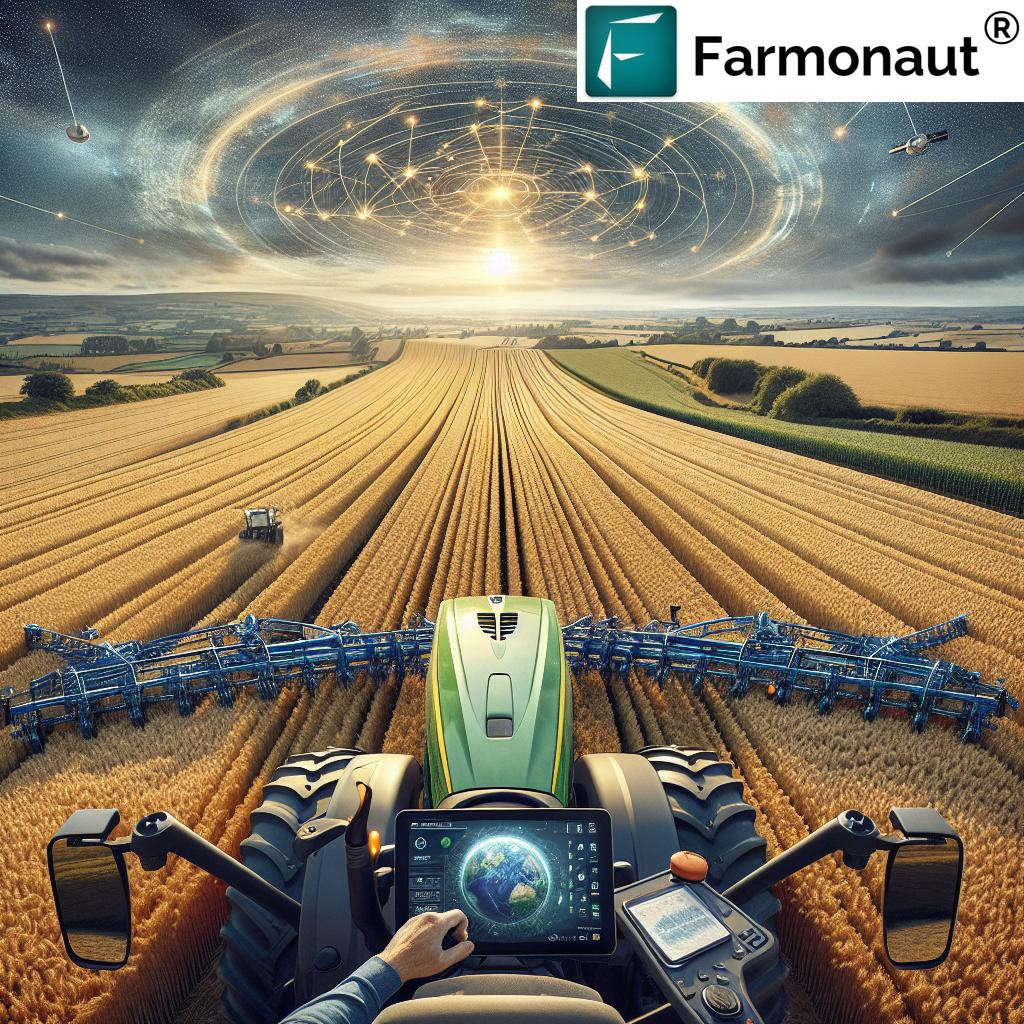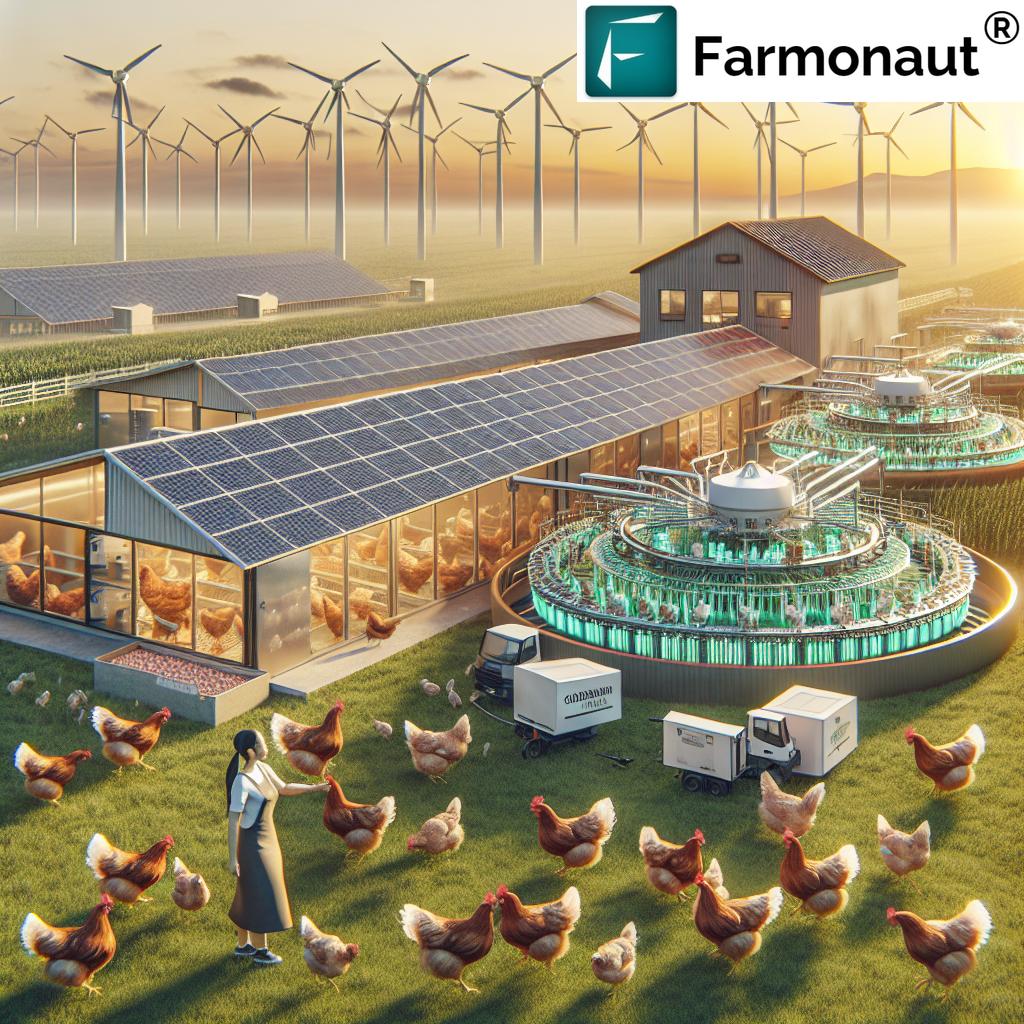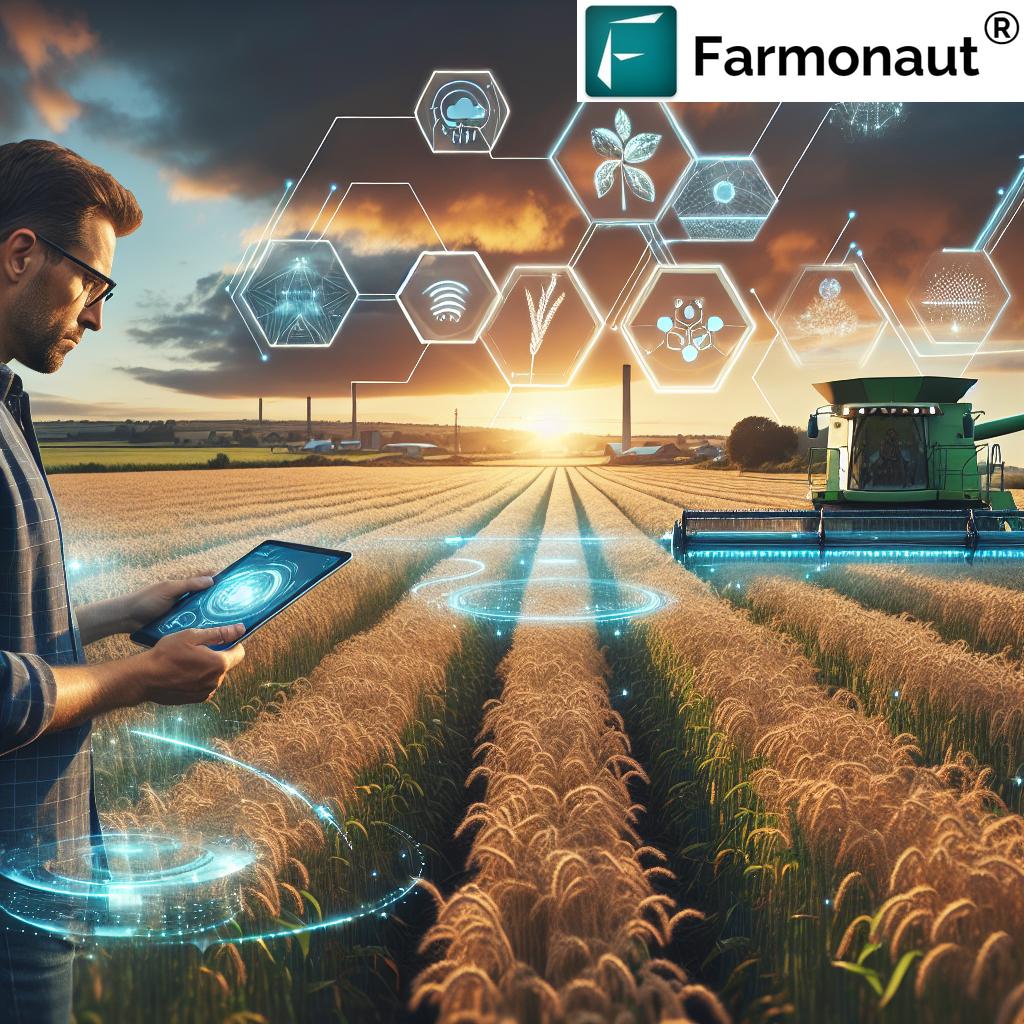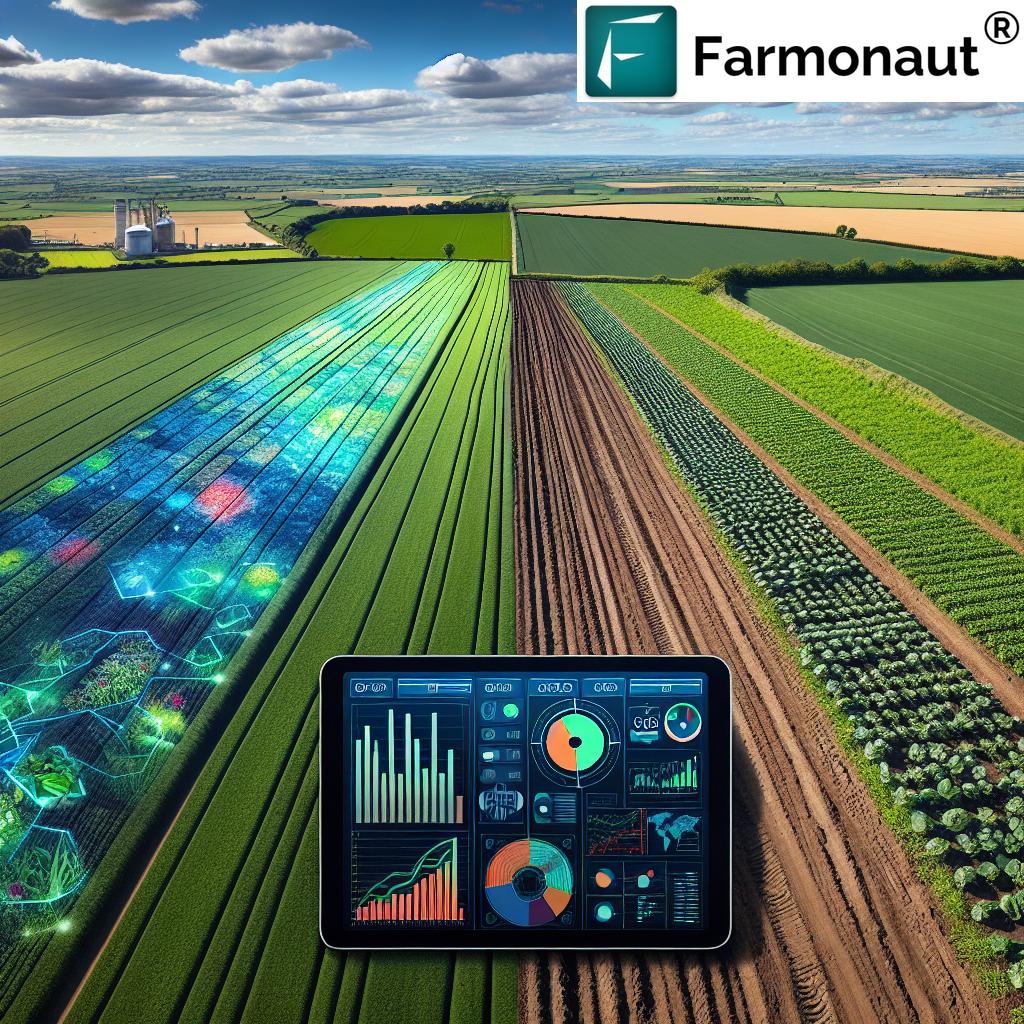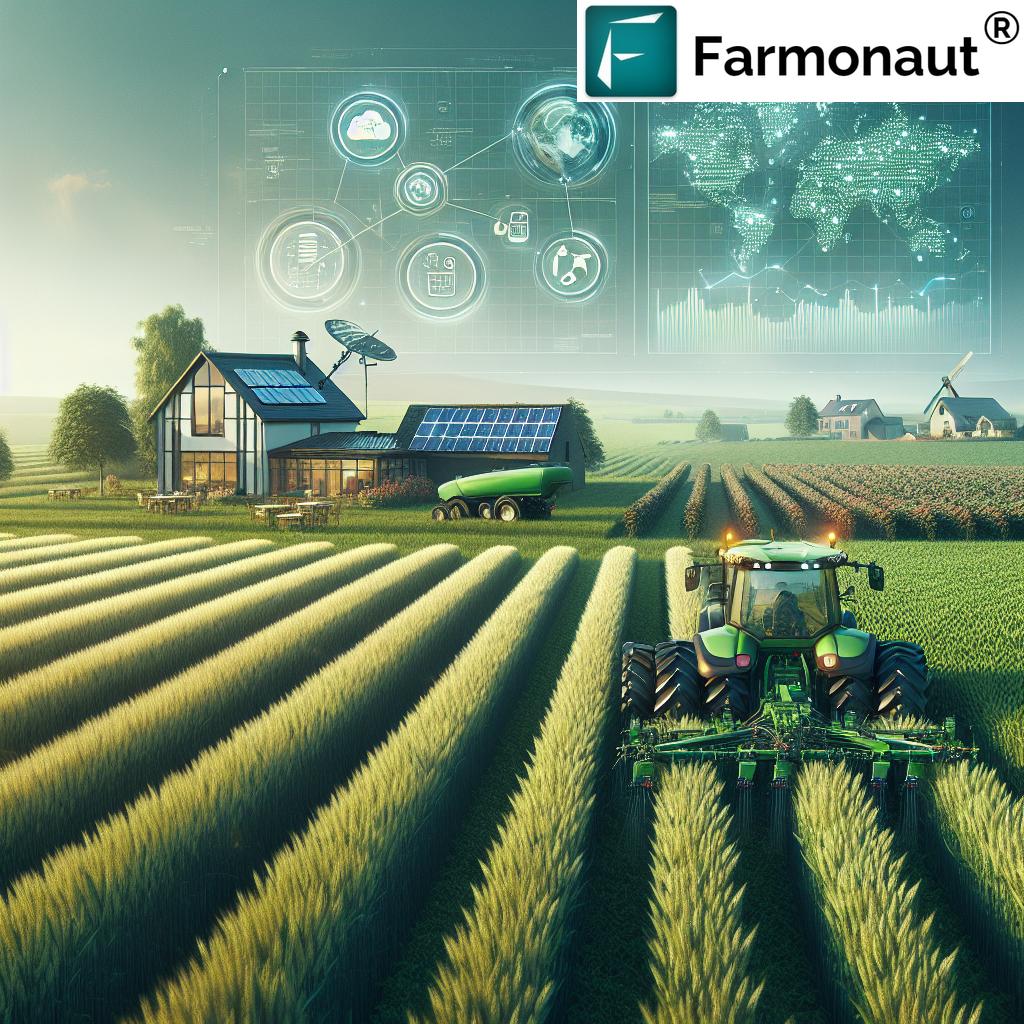UK Food Security at Risk: Farmonaut Analyzes Critical Challenges in Agricultural Supply Chains
“The UK’s National Farmers’ Union reports that 40% of farmers have reduced production due to rising costs and supply chain issues.”
In recent years, the United Kingdom’s agricultural sector has faced unprecedented challenges, raising serious concerns about the nation’s food security and the sustainability of its farming practices. As representatives of Farmonaut, a leading agricultural technology company, we recognize the critical nature of these issues and are committed to providing innovative solutions to support UK farmers and strengthen the agricultural supply chain.
The complexities of the UK food supply system have been exacerbated by a perfect storm of global disruptions, inflationary pressures, and the far-reaching implications of Brexit. These factors have not only strained the ability of farmers to source essential inputs but have also highlighted the vulnerabilities in our domestic food production capabilities. In this comprehensive analysis, we will explore the key trends shaping UK agriculture, examine the critical challenges facing the sector, and discuss how cutting-edge technologies, including Farmonaut’s advanced remote sensing solutions, can play a pivotal role in overcoming these obstacles.

The Current State of UK Agriculture
To fully grasp the gravity of the situation, it’s essential to understand the current landscape of UK agriculture. The sector is diverse, encompassing arable farming, livestock production, and a growing trend towards farm diversification. Here are some key statistics and trends:
- Approximately 70% of the UK’s land area is dedicated to agriculture
- The industry contributes around £10 billion annually to the UK economy
- There are approximately 212,000 farm holdings in the UK
- The average farm size is 87 hectares, but this varies significantly across regions
- Cereals, particularly wheat and barley, dominate arable production
- Livestock farming, including cattle, sheep, and pigs, remains a crucial component of UK agriculture
Despite its significance, the sector faces numerous challenges that threaten its stability and, by extension, the nation’s food security.
Critical Challenges in UK Agricultural Supply Chains
The UK’s agricultural supply chains are under immense pressure from various factors. Let’s delve into the most pressing issues:
1. Brexit-Related Disruptions
The UK’s departure from the European Union has had profound implications for the agricultural sector:
- New trade barriers and customs procedures have complicated the import and export of agricultural goods
- Changes in subsidy structures have created uncertainty for farmers
- Labour shortages, particularly in seasonal work, have affected harvests and processing
2. Global Supply Chain Disruptions
The COVID-19 pandemic and geopolitical tensions have exposed vulnerabilities in global supply chains:
- Shortages of fertilizers, pesticides, and other essential inputs
- Increased shipping costs and delays in transportation
- Volatility in market prices for agricultural commodities
3. Climate Change and Environmental Pressures
The agricultural sector is both affected by and contributes to climate change:
- Extreme weather events, such as floods and droughts, are becoming more frequent
- Changing weather patterns affect crop yields and livestock management
- Pressure to reduce the environmental impact of farming practices
4. Labour Shortages
The UK farming industry heavily relies on seasonal workers, many of whom traditionally came from EU countries:
- Reduced access to EU labour markets has created significant workforce gaps
- Challenges in recruiting and retaining skilled agricultural workers
- Increased labour costs impacting farm profitability
5. Technological Adoption Barriers
While technology offers solutions to many challenges, its adoption faces obstacles:
- High initial costs for implementing precision farming technologies
- Lack of digital infrastructure in rural areas
- Skills gap in using advanced agricultural technologies
“Farmonaut’s remote sensing technology can increase crop yields by up to 20% through precise monitoring and management.”
Impact on UK Food Security
These challenges collectively pose a significant threat to UK food security. The National Farmers’ Union has highlighted several concerning trends:
- Reduced domestic food production due to increased costs and uncertainties
- Greater reliance on food imports, making the UK more vulnerable to global supply chain disruptions
- Potential for increased food prices, affecting affordability for consumers
- Risk of reduced diversity in the UK’s food supply
To address these issues effectively, a multi-faceted approach is required, combining robust agricultural policies, innovative farming practices, and cutting-edge technologies.
Solutions and Strategies for Strengthening UK Agriculture
At Farmonaut, we believe that technology, combined with sound policy and sustainable practices, can play a crucial role in overcoming the challenges facing UK agriculture. Here are some key strategies and solutions:
1. Embracing Precision Agriculture
Precision agriculture techniques, powered by advanced technologies like those offered by Farmonaut, can significantly enhance farm productivity and resource efficiency:
- Satellite-based crop health monitoring for optimized resource use
- AI-driven advisory systems for informed decision-making
- Precision application of inputs to reduce costs and environmental impact
Learn more about Farmonaut’s satellite-based solutions: Farmonaut Web App

2. Sustainable Farming Practices
Adopting sustainable farming methods can help mitigate environmental impacts and improve resilience:
- Crop rotation and diversification to improve soil health
- Integrated pest management to reduce reliance on chemical pesticides
- Water conservation techniques and efficient irrigation systems
3. Farm Diversification
Diversifying farm activities can provide additional income streams and reduce risk:
- Agritourism initiatives
- On-farm processing and direct-to-consumer sales
- Renewable energy production (e.g., solar farms, wind turbines)
4. Strengthening Local Supply Chains
Developing robust local and regional supply chains can reduce dependence on imports and increase resilience:
- Promoting local food networks and farmers’ markets
- Investing in local processing and storage facilities
- Encouraging collaboration between farmers and local businesses
5. Enhancing Traceability and Transparency
Implementing advanced traceability systems can build consumer trust and improve supply chain efficiency:
- Blockchain-based solutions for end-to-end product tracking
- QR code systems for consumer access to product information
- Integration of IoT devices for real-time monitoring
Explore Farmonaut’s API for custom agricultural solutions: Farmonaut API
6. Investment in Agricultural Education and Skills Development
Addressing the skills gap in the agricultural sector is crucial for long-term sustainability:
- Developing agricultural education programs in schools and universities
- Providing training in modern farming techniques and technologies
- Creating apprenticeship and mentorship programs for young farmers
7. Policy Support and Government Initiatives
Effective agricultural policies can provide the necessary framework for a thriving farming sector:
- Developing a comprehensive national food strategy
- Providing targeted subsidies for sustainable farming practices
- Investing in rural infrastructure and digital connectivity
Farmonaut’s Role in Strengthening UK Agriculture
As a leading provider of agricultural technology solutions, Farmonaut is committed to supporting UK farmers and strengthening the agricultural sector. Our advanced remote sensing technology and data-driven insights offer numerous benefits:
- Real-time crop health monitoring for optimized resource management
- AI-powered advisory systems for informed decision-making
- Precision agriculture tools to increase yields and reduce input costs
- Blockchain-based traceability solutions for enhanced supply chain transparency
- Carbon footprint tracking to support sustainable farming practices
Download Farmonaut’s mobile apps for on-the-go farm management:


By leveraging these technologies, UK farmers can increase productivity, reduce environmental impact, and build more resilient agricultural operations.
A Comparative Analysis: Challenges and Solutions
To provide a clear overview of the challenges facing UK agriculture and potential solutions, including Farmonaut’s contributions, we’ve compiled the following table:
| Challenge | Impact on Food Security | Potential Solutions |
|---|---|---|
| Supply Chain Disruptions | High (30% reduction in efficiency) |
– Strengthening local supply chains – Farmonaut’s blockchain-based traceability – Investment in domestic processing facilities |
| Brexit Implications | Moderate (15% increase in trade barriers) |
– Developing new trade agreements – Diversifying export markets – Enhancing domestic production capabilities |
| Climate Change Effects | Severe (20% yield volatility) |
– Adoption of climate-resilient crop varieties – Farmonaut’s satellite-based crop monitoring – Implementation of water conservation techniques |
| Labour Shortages | High (25% workforce gap) |
– Automation and robotics in farming – Farmonaut’s AI-driven advisory systems – Investment in agricultural education and training |
| Technological Adoption Barriers | Moderate (40% of farms lack advanced tech) |
– Government subsidies for tech adoption – Farmonaut’s affordable precision agriculture solutions – Improving rural digital infrastructure |
This table illustrates the multifaceted nature of the challenges facing UK agriculture and the diverse range of solutions required to address them. Farmonaut’s technologies play a crucial role in many of these solutions, offering innovative approaches to improve efficiency, sustainability, and resilience in the agricultural sector.
The Future of UK Agriculture: Trends and Predictions
As we look to the future of UK agriculture, several trends are likely to shape the industry:
- Increased Automation: The adoption of robotics and AI in farming operations will accelerate, helping to address labour shortages and improve efficiency.
- Vertical Farming: Urban and indoor farming techniques will gain prominence, particularly for high-value crops and in areas with limited agricultural land.
- Regenerative Agriculture: There will be a growing focus on farming practices that restore soil health and enhance biodiversity.
- Data-Driven Decision Making: The use of big data and analytics in farm management will become standard practice, with technologies like Farmonaut’s playing a central role.
- Alternative Proteins: The production of plant-based and lab-grown proteins is likely to increase, diversifying the UK’s protein sources.
Conclusion: Building a Resilient and Sustainable UK Agricultural Sector
The challenges facing UK agriculture and food security are significant, but not insurmountable. By embracing innovative technologies, adopting sustainable practices, and implementing supportive policies, we can build a more resilient and efficient agricultural sector. Farmonaut is committed to playing a crucial role in this transformation, providing farmers with the tools and insights they need to thrive in an increasingly complex environment.
As we move forward, collaboration between farmers, technology providers, policymakers, and consumers will be essential. By working together, we can ensure that UK agriculture not only overcomes its current challenges but emerges stronger, more sustainable, and better equipped to feed the nation for generations to come.
The future of UK food security depends on our ability to innovate, adapt, and collaborate. With the right approach and tools, we are confident that UK agriculture can meet these challenges head-on and build a brighter, more sustainable future for all.
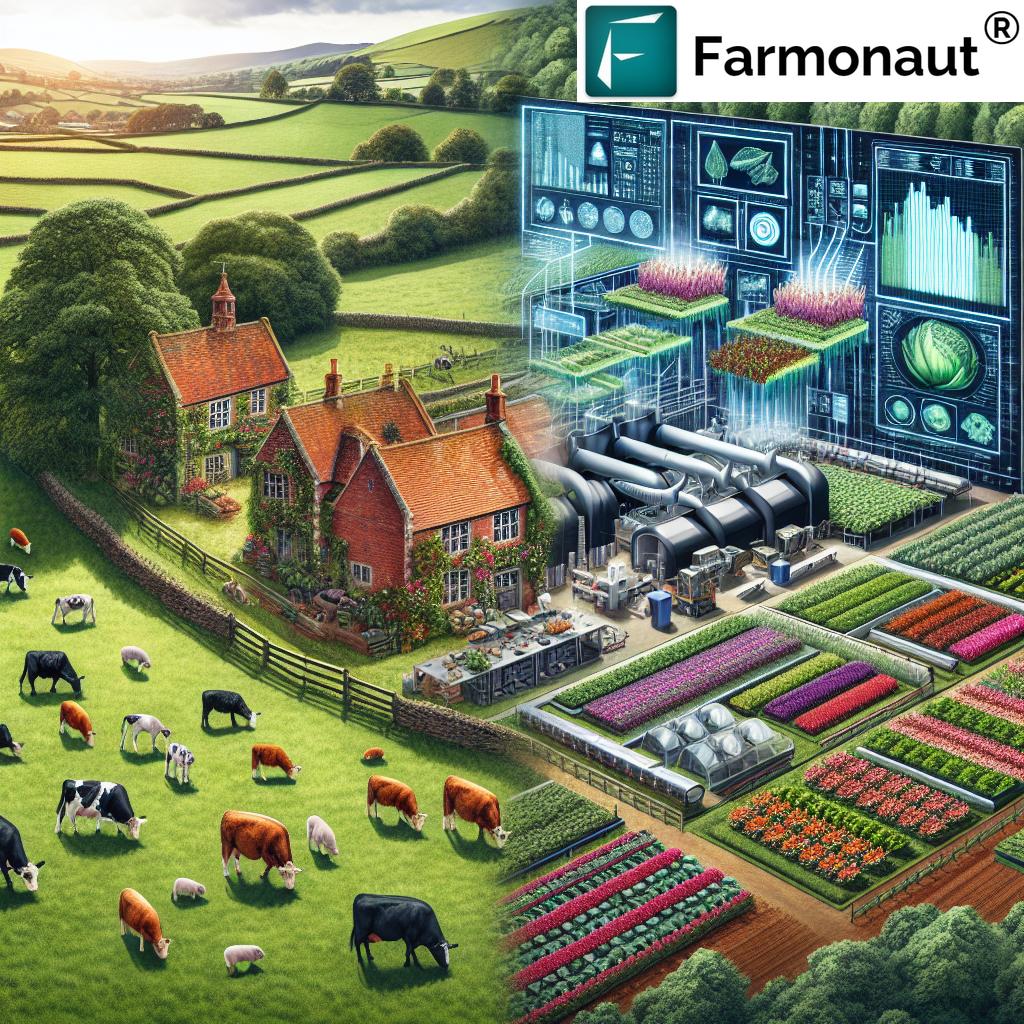
Frequently Asked Questions (FAQ)
- How does Brexit impact UK food security?
Brexit has introduced new trade barriers, affecting the import and export of agricultural goods. It has also led to labour shortages in the farming sector, potentially reducing domestic food production capacity. - What role does technology play in addressing agricultural challenges?
Technology, such as Farmonaut’s remote sensing solutions, can improve farm efficiency, optimize resource use, and provide valuable insights for decision-making, helping farmers overcome various challenges. - How can farmers adapt to climate change?
Farmers can adapt by implementing sustainable practices, using climate-resistant crop varieties, and leveraging technologies like satellite monitoring to better manage their resources. - What is farm diversification, and why is it important?
Farm diversification involves expanding into non-traditional farming activities to create additional income streams. It’s important for reducing financial risk and increasing farm resilience. - How can consumers support UK food security?
Consumers can support UK food security by choosing locally produced foods, supporting farmers’ markets, and being mindful of seasonal produce.
Farmonaut Subscriptions
For more information on how Farmonaut can support your farming operations, visit our API Developer Docs.


